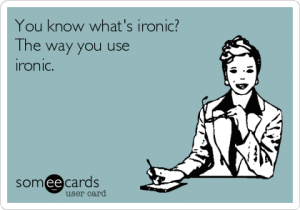Four Words That Originally Meant Something Else
Remember those four words I once mentioned that people sometimes use incorrectly? Well, today’s post briefly continues on that topic to discuss four words that originally meant something different from the definitions many people use today. If you can think of more words that fit this category, please feel free to share. I’d love to write about them in the future! Thanks, and enjoy!
Egregious meant “outstanding” before it meant “horrendous”
“Egregious” was the second Word of the Week I ever shared on my blog, and I still think it’s as fun to say now as it was back then. Interestingly, this word used to mean something positive before sarcasm turned it into something negative. The original definition of “egregious” was “remarkably good”, while today it means “shockingly bad”. It’s likely this newer derogatory sense from the late 16th century arose as a twist of irony. Speaking of which…
Ironic meant “paradoxical” before it meant “sarcastic”
 I know I’ve already mentioned this word before, but it’s worth bringing up again here. Many people seem to think that “ironic” is synonymous to “sarcastic”, but while this use is widely accepted nowadays, that wasn’t always the case. An “ironic” event is when something happens that’s the opposite of what would be expected, often to a humorous effect. There’s no harm in pointing out the irony in your life, of course, as long as you understand what it is!
I know I’ve already mentioned this word before, but it’s worth bringing up again here. Many people seem to think that “ironic” is synonymous to “sarcastic”, but while this use is widely accepted nowadays, that wasn’t always the case. An “ironic” event is when something happens that’s the opposite of what would be expected, often to a humorous effect. There’s no harm in pointing out the irony in your life, of course, as long as you understand what it is!
Peruse meant “scrutinize” before it meant “scan”
“Peruse” is another word I’ve written about before in my vocabulary segment. What caught my attention about it was the fact that many people think it means the opposite of what it really does. Over time, the verb seems to have become a go-to word for “scan” or “read through quickly”. However, according to its dictionary entries, “peruse” actually means “read in a thorough or careful way”. So the next time you’re asked to “peruse” an important document or other written work, make sure you do it right!
Virtual meant “almost” before it meant “digital”
Perhaps you always assumed “virtual” meant “digital” from the first time you heard about “virtual reality”, and it came as quite a shock to you when you learned that this word originally meant something different. Or maybe that was just me. Either way, “virtual” wasn’t always the pervasive adjective for computer simulation that it is today. What it has always meant since late Middle English, though, is “almost as described”. There are a few other definitions for “virtual” as well (such as in optics and physics), but since you’re most likely to see it in references to computers these days, the rest may be “virtually” irrelevant!
Have you misinterpreted these words before? What other examples can you think of?


Recent Comments